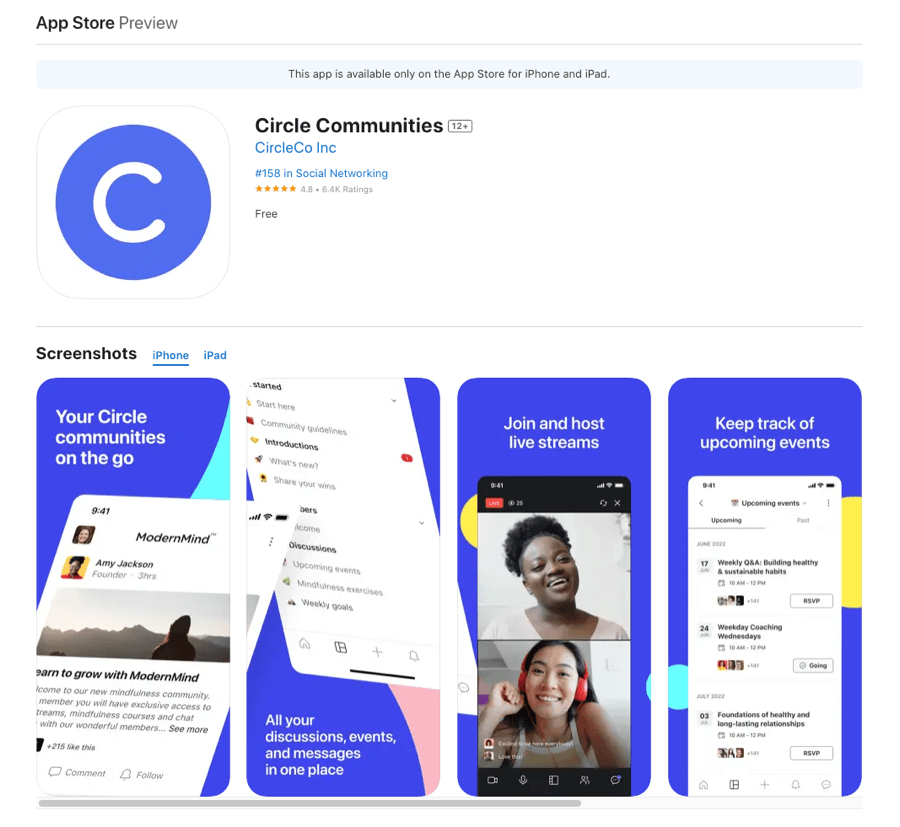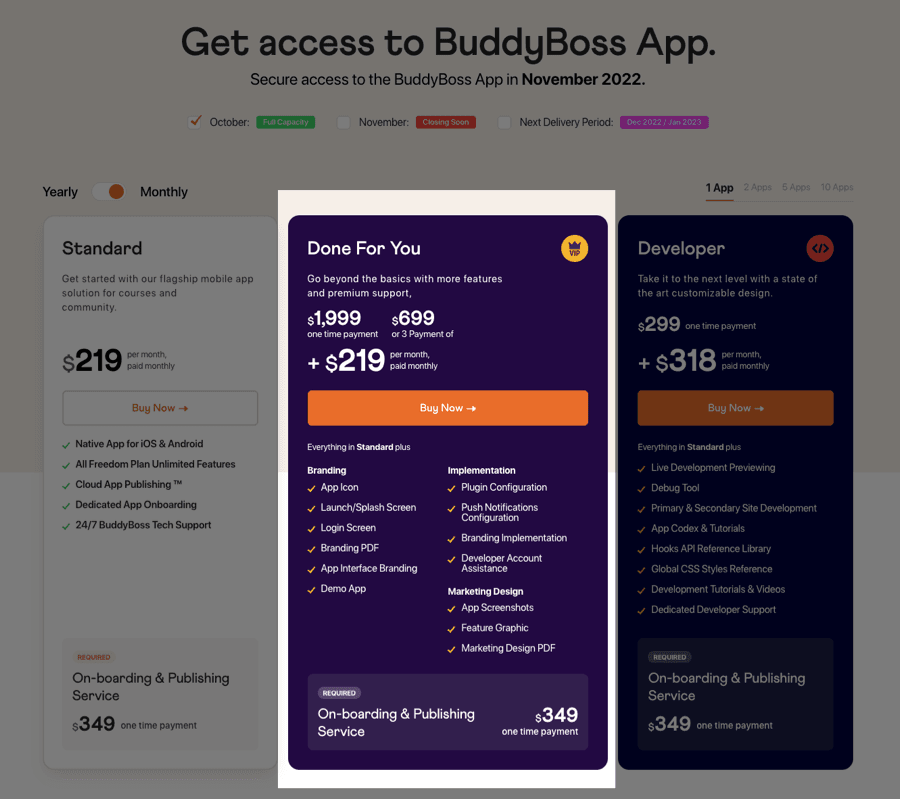We earn a commission from partner links on this site. This doesn’t affect our opinions or evaluations.
In the year 2025, digital interactions have predominantly shifted away from traditional web-based applications towards mobile phones and tablet devices. It is on these platforms that a significant 55% of all social media activity now takes place.
Given that this prevailing pattern is anticipated to persist, it has become nearly essential for online communities to provide their members with convenient access through dedicated mobile applications.
Recognizing this important development, we have meticulously prepared an extensive instructional resource designed to guide you through the process of developing your own community application.
Within this guide, we will thoroughly explore the various pathways accessible for introducing your unique community app, detailing the advantages and disadvantages associated with each option. This will empower you to select the most suitable approach aligned with your specific needs.
A community app functions as a dedicated mobile application that enables members to engage with your community and access content directly on their smartphones or tablets.
The fundamental distinction between a native app and a mobile-responsive community lies in the access method. With an app, users download it straight to their devices, while web-based communities require browser navigation to reach the content.
Most community creators initially launch their platforms as browser-based experiences. Then, as they develop their online communities and build momentum, they invest in creating a custom community mobile application.
Having a dedicated community app offers several advantages over browser-only platforms:
One notable example of a community utilizing branded mobile applications is Kula by Yoga.
This organization primarily focuses on yoga instruction and coaching services, with their community component enhancing this core business by creating space for members to connect and communicate.
While members can access the community through web browsers, they also benefit from dedicated iOS and Android applications for an optimized mobile experience.
Course creators face a crucial decision when selecting the right learning management system plugin for their needs.
Our comprehensive research reveals that 83,415 educational websites have implemented
LearnDash as their WordPress learning platform, establishing it as the industry frontrunner with a commanding 34.8% market presence.
Following closely behind, the second most widely adopted learning management options include LearnPress, currently powering 74,379 websites (31%), and Tutor LMS, which serves as the foundation for 45,623 educational sites (19%).
The educational website landscape is further diversified with MasterStudy LMS (4.9%), Lifter LMS (4.2%), Sensei LMS (3.7%), WP Courseware (1.9%), and AccessAlly (0.4%) collectively accounting for the remaining market distribution.

Several digital community solutions provide complimentary mobile applications that enable end-users to seamlessly access any community developed within their ecosystem.
The standout community-building platform offering free mobile application integration is Circle.so.
This cloud-powered community solution empowers creators to establish vibrant online communities directly on their websites. Its widespread adoption stems from its comprehensive suite of community development tools.
The platform delivers fully-featured applications for both iOS and Android operating systems at no additional cost. Community members can either download these applications directly through their respective app marketplaces or request a convenient download link from within your community environment.

Mighty Networks represents another leading community platform offering complimentary mobile applications for community members. Their iOS application is fully available to all Circle platform creators, while their Android counterpart remains in the final testing phase.
An excellent illustration of a thriving online community embracing this strategy is Simply Scrapper, who successfully implements this approach through Mighty Networks’ bundled community applications.
They provide clear guidance to their community members, directing them to download the Mighty Networks application from either the Apple App Store or Google Play marketplace. After installation, members simply register using their existing email credentials and immediately gain access to all functionality available in the web version.

The primary benefit of implementing these platform solutions lies in their cost-effectiveness. These applications come without supplementary expenses. You’ll avoid technical implementation challenges, coding requirements, or complex setup procedures. The platform providers handle all technical aspects comprehensively.
Community participants simply need to install the appropriate application on their mobile device and navigate directly to your community space to begin their interactive experience.
It’s essential to recognize that these applications represent the platform provider’s brand identity rather than your unique branded experience. Consequently, you won’t achieve the premium, customized aesthetic that many established brands consider crucial for their digital presence.
This arrangement might potentially create confusion among your community members who may lack familiarity with Mighty Networks or Circle platforms, potentially requiring additional explanation and onboarding support.
For those interested in developing a fully customized, branded community application that reflects your unique identity, continue reading as we explore this comprehensive option in the following section.
Several premier community platforms offer dedicated branded application development services. The industry leaders in this space include Mighty Networks, Disciple, and BuddyBoss.
Beyond their complimentary application offerings, Mighty Networks provides comprehensive white-label mobile application development services.
To implement fully branded applications through their ecosystem, you’ll need to subscribe to Mighty Pro, their premium service tier specifically designed for creating customized iOS and Android applications tailored to your community’s unique identity.
While their website doesn’t publicly display precise pricing information for this exclusive service tier, industry estimates suggest the annual investment for Mighty Pro services typically approaches approximately $30k.

Another worthwhile solution to evaluate is Disciple. Similar to Mighty Networks, this platform functions as a fully-hosted community development system that enables rapid and straightforward community establishment.
Their custom-branded mobile application packages begin at $7,596 annually. The entry-level subscription accommodates communities with up to 1,000 active participants, while their mid-tier offering at $12,000 per year expands capacity to support communities with 10,000 members.

The third compelling option to consider is BuddyBoss. Unlike the previously mentioned solutions, this platform doesn’t operate as an independent system. Instead, this specialized community application builder has been purposefully designed for integration with WordPress websites.
With BuddyBoss, you gain access to fully customized iOS and Android applications for your community ecosystem. Their team handles the complete application setup process and provides continuous technical support throughout your journey.
For optimal application development, we recommend selecting their Done For You package, which requires an initial investment of $2,348 as a single payment, followed by an ongoing monthly subscription of $219.

A noteworthy illustration of a community implementing branded applications effectively is Kwik Brain Universe.
This thriving community operates on the Mighty Networks infrastructure; members enjoy seamless access through both their web-based platform and their professionally designed custom mobile applications.

The most significant advantage of implementing these platform-based solutions lies in their comprehensive service approach. The entire application development process is professionally managed on your behalf. These applications maintain perfect synchronization with your web-based community environment, delivering consistent experiences for members regardless of their chosen access method.
Beyond the streamlined implementation process, the platform’s dedicated technical specialists handle all ongoing maintenance requirements and ensure regular feature updates.
This approach represents the most efficient pathway to establishing branded community applications. Naturally, selecting the ideal solution depends on your specific functionality requirements and available investment resources.
Nevertheless, if these established options don’t align perfectly with your business objectives, continue reading to explore fully customized application development alternatives.
The final pathway for acquiring a community application involves commissioning custom development services. This approach provides comprehensive control over every element of your application’s branding, design elements, and functional capabilities.
To pursue custom application creation, you’ll need to engage professional development specialists or teams capable of transforming your conceptual vision into a tangible digital product.
Nevertheless, this level of customization commands a substantially higher investment. Realistically, the financial commitment will likely extend into tens of thousands of dollars, accompanied by a development timeline spanning multiple months.
This represents our least recommended strategy, as most community creators’ requirements can be effectively fulfilled through platforms offering pre-configured branded application solutions.
In fact, before committing to a fully customized approach, we strongly suggest exploring the available customization options for branded applications with your chosen platform’s technical team.
Considering all factors, the majority of community operators won’t require this level of customization. This option should primarily be considered by enterprises that position their application as their central product offering and have already established verified market demand for such a solution.
We’ve now explored the complete spectrum of approaches available for developing your community application.
Let’s distill the key options we’ve examined:
We trust you’ve found this comprehensive guide valuable in identifying the optimal solution for creating your community application.
Should you have additional questions or need further clarification, please share your thoughts in the comments section below. Our team welcomes the opportunity to provide further assistance!
When analyzing this comprehensive dataset, it’s important to consider that the total number of WordPress learning management system websites offering membership services exceeds these figures substantially. This discrepancy exists because several leading platforms such as LearnDash, LifterLMS, and AccessAlly incorporate native membership capabilities directly within their core functionality.

Daniel NicFounder, SellingOnliceCoursesGuide.comis an entrepreneur and digital education specialist who founded sellingonlinecoursesguide.com, a platform dedicated to helping creators and educators successfully navigate the online course marketplace. Through his website, he shares insights and strategies for developing, marketing, and monetizing online educational content. His work focuses on empowering course creators to build sustainable online businesses while effectively sharing their knowledge with students worldwide.

Daniel Nic is an entrepreneur and digital education specialist who founded sellingonlinecoursesguide.com, a platform dedicated to helping creators and educators successfully navigate the online course marketplace. Through his website, he shares insights and strategies for developing, marketing, and monetizing online educational content. His work focuses on empowering course creators to build sustainable online businesses while effectively sharing their knowledge with students worldwide.

We respect your privacy and will never spam you.